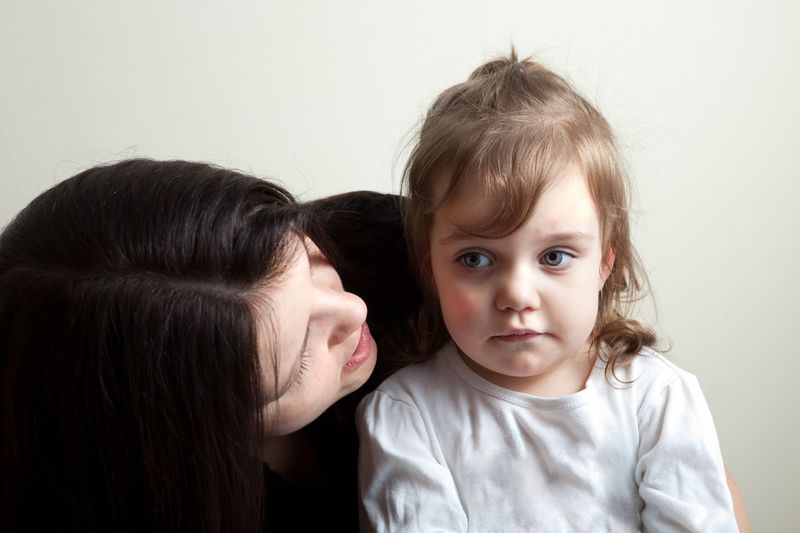13 Emotionally Neglectful Habits Parents Don’t Realize They’re Doing

Parents generally want the best for their children, but sometimes their actions can unintentionally cause emotional harm. Even loving parents might engage in behaviors that leave lasting impacts on their children’s emotional development. Understanding these common patterns of emotional neglect is the first step toward creating healthier parent-child relationships and raising emotionally intelligent kids.
1. Dismissing Their Child’s Emotions

When parents say phrases like “You’re fine” or “Stop crying” after a child expresses sadness, they’re inadvertently teaching their child that certain emotions aren’t acceptable. Children learn quickly which feelings are “allowed” in the family and which ones they should hide or suppress.
This dismissal creates a disconnect between what children feel internally and what they believe they can safely express. Over time, kids might stop sharing their true feelings altogether, creating an emotional wall between themselves and their parents.
Children need validation that all emotions are normal and acceptable, even uncomfortable ones like anger, fear, or disappointment. When parents acknowledge feelings first before moving to solutions, they help children develop emotional intelligence and healthy coping mechanisms.
2. Prioritizing Achievement Over Connection

Many well-meaning parents focus intensely on grades, sports trophies, and accomplishments, believing these achievements will secure their child’s future happiness. The family calendar becomes packed with enrichment activities while quiet connection time disappears.
Children in achievement-focused homes often develop a dangerous equation in their minds: “I am loved when I perform well.” This conditional love message creates anxiety and insecurity. These children might become high-achieving adults who never feel quite good enough despite their successes.
The antidote is simple but powerful: showing genuine interest in who your child is rather than just what they accomplish. Regular moments of connection—playing games, sharing meals without distractions, or having casual conversations about their interests—build the emotional security children truly need.
3. Not Apologizing After Hurting Their Child

Parents yell, make mistakes, and sometimes say hurtful things they don’t mean. Everyone does. The real damage happens when parents never acknowledge these moments or apologize afterward, acting as though nothing happened.
Children are extremely perceptive. When parents refuse to apologize, kids learn that powerful people don’t need to take responsibility for their actions. This creates confusion about healthy relationships and accountability.
A simple, sincere apology teaches children something profound: everyone makes mistakes, and what matters is how we repair the harm we cause. “I’m sorry I yelled earlier. You didn’t deserve that” shows tremendous strength, not weakness, and models the emotional responsibility we hope our children will develop themselves.
4. Rarely Showing Affection

Some families operate with an unspoken rule against physical or verbal affection. Parents might have grown up in homes where “I love you” was rarely heard, creating a cycle where touch and tender words feel awkward or unnecessary.
Children crave physical connection—hugs, gentle touches on the shoulder, or playful roughhousing. These moments of contact release oxytocin, the bonding hormone that helps children feel secure and loved. Without this affection, children may develop touch aversion or struggle with intimacy later in life.
Breaking this pattern doesn’t require grand gestures. Small, consistent moments of warmth make a difference: a quick hug before school, a hand on the back while talking, or saying “I love you” regularly. These simple actions speak volumes to a child’s developing heart and mind.
5. Avoiding Emotional Conversations

“Everything’s fine” becomes the family mantra in homes where difficult emotions are swept under the rug. Parents might change the subject when children bring up fears, grief, or uncomfortable questions about topics like death or family conflicts.
This avoidance creates a household where only positive emotions feel welcome. Children become emotional detectives, sensing the unspoken rule that certain feelings make adults uncomfortable. They learn to smile through pain rather than express authentic emotions.
Brave parents create space for the full spectrum of human feelings. When a child shares something difficult, simply sitting with them and saying, “That sounds really hard—tell me more” opens doors to emotional intimacy that will serve them throughout life. These conversations might feel awkward at first but become easier with practice.
6. Being Emotionally Unavailable

Physical presence doesn’t guarantee emotional availability. Many parents share space with their children while remaining mentally elsewhere—absorbed in work emails, social media, or their own worries and stresses.
Children experience this disconnection as abandonment, even when parents are technically “there.” They learn their thoughts and feelings aren’t interesting enough to compete with a smartphone screen. Eventually, many stop trying to connect altogether.
True presence requires putting down devices and making eye contact during conversations. It means temporarily setting aside adult preoccupations to enter a child’s world completely. These moments of full attention—even just 15 minutes daily—communicate a powerful message: “You matter to me more than anything else right now.”
7. Using Guilt as a Tool

“After everything I’ve done for you…” These words might slip out during moments of frustration, but they place an invisible emotional burden on children. Guilt becomes the primary motivator rather than genuine desire to cooperate or contribute.
Children raised with guilt tactics often develop an unhealthy sense of responsibility for others’ emotions. They learn to prioritize keeping parents happy above their own needs. This pattern can follow them into adulthood, creating relationships where they feel responsible for everyone’s feelings but disconnected from their own.
Healthy family relationships operate on mutual respect rather than emotional debt. Children contribute because they’re valued members of the family unit, not because they owe their parents for basic care. Phrases like “I’d appreciate your help” rather than “You never help me” nurture cooperation without manipulation.
8. Invalidating Sensitive Temperaments

“You’re too sensitive” might seem like helpful feedback, but for naturally sensitive children, these words feel like rejection of their core personality. Some children simply experience emotions more intensely than others—they notice subtle changes in mood, react strongly to criticism, and feel deeply moved by beauty or suffering.
When parents consistently label this sensitivity as problematic, children internalize the message that something is fundamentally wrong with them. They begin suppressing their natural responses to appear “normal,” creating internal conflict and anxiety.
Reframing sensitivity as a strength changes everything. Sensitive children often grow into empathetic adults with rich emotional lives and strong interpersonal skills. Rather than trying to toughen them up, parents can help sensitive children understand their unique wiring while teaching healthy boundaries and self-regulation tools.
9. Minimizing or Ignoring Bullying

“Just ignore them” rarely solves bullying problems, yet parents often offer this advice believing it will toughen their children. When children gather courage to report social pain, dismissive responses teach them they’re alone in navigating complex peer dynamics.
Children experiencing bullying need validation first—acknowledgment that their suffering matters and isn’t their fault. Without this support, they may internalize the bullies’ messages, believing they deserve mistreatment or that speaking up is pointless.
Effective parents listen without judgment, ask questions to understand the situation fully, and collaborate on solutions. Sometimes this means teaching assertiveness skills; other times it requires adult intervention. Either way, the child learns they have an ally in their corner, building trust that will encourage them to seek help with future challenges.
10. Comparing Siblings or Other Kids

Comparisons slip easily into everyday conversation: “Why can’t you be organized like your brother?” or “Look how nicely Sophia sits at her desk.” These seemingly innocent comments plant seeds of rivalry and resentment that can last decades.
Each child arrives with a unique combination of strengths, challenges, and personality traits. When parents constantly measure one child against another, they miss seeing and celebrating these individual differences. Children begin defining themselves in opposition to siblings rather than discovering their authentic selves.
Noticing each child’s distinct qualities without comparison fosters security rather than competition. “I noticed how patiently you worked on that puzzle” acknowledges effort without reference to others. This approach helps children develop intrinsic motivation and appreciation for their own journey rather than constant social comparison.
11. Over-reliance on Discipline Over Dialogue

Rules without relationship breed rebellion. Some parents focus exclusively on correcting behavior through punishment without exploring the feelings and needs driving that behavior. The approach might temporarily stop problems but misses valuable teaching moments.
Children acting out are usually communicating something important—perhaps they’re overwhelmed, seeking attention, or testing boundaries to feel secure. When discipline becomes the only response, the underlying message remains unheard and unaddressed.
Balanced parenting includes both boundaries and understanding. “I see you’re having a hard time following our screen time rules. What’s making it difficult?” opens conversation while maintaining expectations. This approach helps children develop self-awareness and problem-solving skills rather than simply learning to avoid punishment.
12. Not Modeling Emotional Intelligence

Children learn more from what parents do than what they say. Parents who hide their emotions, explode in anger, or numb feelings with substances teach powerful unspoken lessons about emotional management.
The disconnect becomes particularly confusing when parents tell children to “use their words” or “calm down” while demonstrating the opposite behaviors themselves. Children quickly spot this hypocrisy, creating distrust in parental guidance about emotions.
Authentic emotional modeling means parents acknowledge their own feelings appropriately: “I’m feeling frustrated right now and need a moment to calm down.” This transparency shows children that emotions aren’t dangerous or shameful, just information that needs healthy expression. When parents demonstrate self-regulation during stress, they provide a blueprint children can follow throughout life.
12. Neglecting Emotional Repair After Conflict

Family conflicts happen in every home. The critical difference lies in what happens afterward. Some families move on without addressing emotional wounds, creating invisible rifts that widen over time.
Children need resolution after difficult interactions. Without repair, they remain stuck in fight-or-flight responses, feeling unsafe in their primary relationships. This unresolved tension affects sleep, concentration, and overall well-being.
Healthy repair doesn’t mean parents never get angry or set consequences. Rather, it ensures that connection returns after discipline or disagreements. “I want you to know I love you even when I’m upset about your behavior” maintains the emotional bond while addressing problems. This repair process teaches children that relationships can weather storms and emerge stronger—perhaps the most valuable lesson parents can offer.
13. Treating Childhood Struggles as Inconveniences

A child’s nightmares, separation anxiety, or friendship troubles might seem minor compared to adult problems. Parents sometimes respond with impatience: “You’ll be fine” or “We don’t have time for this right now.” These dismissive reactions minimize experiences that feel enormous in a child’s world.
Children lack perspective on their struggles precisely because they’re still developing. What seems trivial to adults—a friend’s unkind comment or a scary movie—can occupy a child’s entire emotional landscape. When parents treat these concerns as inconveniences, children learn their feelings are burdens.
Compassionate parents remember that childhood struggles are real learning opportunities. Taking a moment to acknowledge fears or disappointments doesn’t create weakness—it builds emotional resilience. “I understand you’re worried about the math test tomorrow. That’s a normal feeling” validates the emotion while still encouraging them to face challenges.

Comments
Loading…